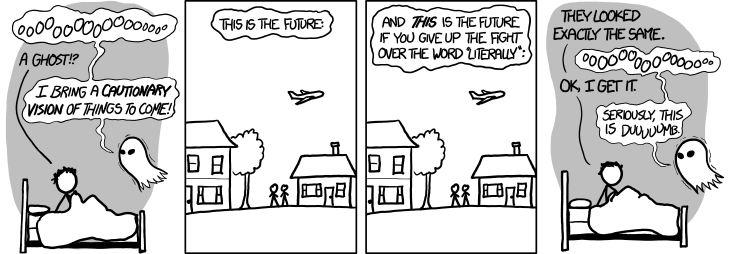
Via xkcd.com, by Randall Munroe
In the past, I’ve alluded to the fact that linguists consider all varieties of language to be equal. A linguist friend of mine suggested that I expand on this topic, and discuss why linguists don’t think any one dialect is better than another. To address this question, let’s talk about the difference between linguists and people who care about “good grammar.” The latter are called “prescriptivists,” because they prescribe the way people should speak; they are sometimes referred to as “grammar Nazis”. Prescriptivists have an idealized standard of language that they believe everyone should follow. Linguists, on the other hand, are “descriptivists”: they describe what people actually say.
Having a standard dialect has many advantages in formal, written language. Agreeing on spelling, punctuation, and rules about writing helps editors and printers make their products uniform, just like McDonalds wants all their burgers to taste exactly the same, no matter where you buy them. However, many prescriptivists take their prescriptivism outside the realm of formal, written language. They judge you when you speak, they judge your Facebook statuses, they judge your tweets. Here are some issues linguists have with prescriptivism (apart from some of the ones I addressed in my post on Language Discrimination).
Language changes. Period. It has changed, it does change, it will change. Language has always changed, and at least since the time of print media, there have always been people to complain about it. Here’s an example from Language Log of a prescriptivist rant from the 19th century:
“This modern form [“is being …”] is very seldom used among writers of the highest class…. “The house is being built” does not express what is intended; being built denotes existence in the state expressed by built; as, “Our house being built, we have now a home.” It would be better for those who are not satisfied with the well-established classical form [“The house is building”] to say, “The house is becoming built” — coming into the state expressed by built.”
This is very different from the construction we use today. If someone were to say “the house is building” now, you might imagine an anthropomorphized house creating other houses. However, that phrasing was the standard in the 19th century, and when it changed, prescriptivists freaked out. And yet, here we are, building houses left and right, and civilization has not collapsed.
People will tell you the old way is always considered clearer, more precise, and just all-around better. They’ll tell you that good grammar is important and creates easier-to-understand sentences that we can better understand. Here’s an example of why using non-standard grammar is considered “confusing”:

While I understand that this is supposed to be a joke, there are a lot of perfectly serious people who argue that they really cannot understand non-standard grammar. Another example of the “unclear” argument is the usage of double negatives. If someone says “I don’t have no pencils,” a prescriptivist may argue, “Oh, they must mean they HAVE pencils, because it’s a double negative! One negative negates the other!” I think that people who make that argument are being a bit disingenuous. Any speaker of English in a normal conversation would not even blink at that sentence. A grammar nazi in that situation might think of the speaker as uneducated, but would never actually think that the speaker has pencils. The argument for clarity is an ad hoc justification for why a usage is “correct.”
For more interesting discussions about prescriptivism and developments in the English language, I highly suggest following work by Anne Curzan on the topic. She writes for the Lingua Franca blog, and she has a show on Michigan Radio which you can listen to online.


Pingback: Like My Blog? You'll Probably Like These Too. | Beyond the Fourth Floor
Pingback: Word Crimes | Beyond the Fourth Floor